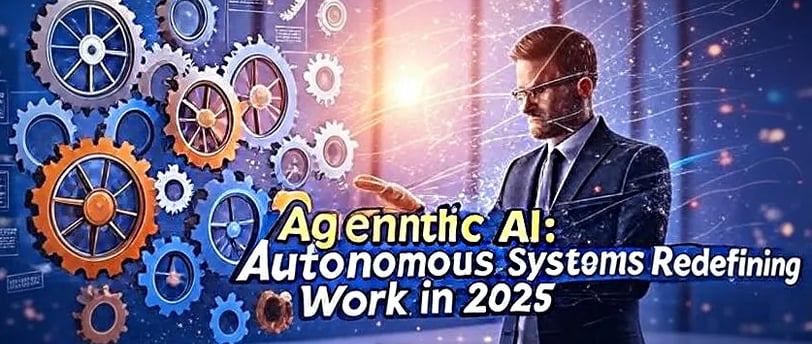Agentic AI: Autonomous Systems Changing Work in 2025
INNOVATION
Yamin Sarker
6/18/20256 min read


Picture a workplace where AI not only answers questions but also manages tasks on its own, improves workflows, and works with people like a digital teammate. Welcome to the age of agentic AI, a revolutionary technology that is changing the way we do business. Agentic AI systems are different from traditional AI systems in that they don't need human prompts to work. They make decisions and adapt to problems as they happen. These self-driving systems are changing industries, making work more productive, and changing the future of work in 2025. Here's how agentic AI is changing the game and how you can use it to help your business or career.
What is AI that is agentic?
Agentic AI is the term for smart systems that can see what's going on around them, think through difficult tasks, and act on their own to reach certain goals. These systems are more advanced than chatbots like ChatGPT, which need constant human input. They use large language models (LLMs), machine learning, and natural language processing. Instead, agentic AI can plan, carry out, and learn from tasks with little help. Gartner says that agentic AI will be the most important technology trend in 2025. By 2028, these systems will make 15% of daily work decisions on their own (Gartner, 2024).
Agentic AI's main features are:
Independence: Works on its own to finish tasks that require several steps, like improving supply chains or handling customer questions.
Adaptability: Changes based on real-time information, like traffic conditions for logistics or market trends for finance.
Working with other AI agents or people to form "digital workforces" that can help them reach difficult goals.
Stat Spotlight: The global market for agentic AI tools is expected to grow at a rate of 56.1% per year from 2024 to 2025, reaching $10.41 billion (SuperAGI, 2025).
How Agentic AI Is Changing Work Agentic AI is changing industries by automating difficult tasks, making decisions better, and encouraging new ideas. Here are three important ways it will change work in 2025, along with real-world examples and data-driven insights.
1. Making business operations more efficient
Agentic AI is great at automating workflows that have more than one step, which saves time and money. For instance, Dow, a company that makes chemicals, used Microsoft's Copilot Studio to make an autonomous agent that checks over 100,000 shipping invoices every year for billing mistakes, saving millions of dollars in logistics costs (Microsoft, 2025). According to Gartner, agentic AI will be able to solve 80% of common customer service problems on its own by 2029, which will save businesses 30% on operating costs (SuperAGI, 2025).
Tip: Find a process in your business that you do over and over, like managing inventory or processing invoices. Use agentic AI tools like Microsoft Copilot Studio or Salesforce Agentforce to do it automatically. Start with a small project to see how much money you can save.
2. Using real-time data to make better decisions
Agentic AI connects to APIs, databases, and IoT devices to look at real-time data and make smart choices. For example, a fintech company uses agentic AI to keep an eye on changes in the market and automatically change the allocations in its portfolios, which boosts returns (IBM, 2024). According to a 2025 McKinsey report, 25% of businesses that use generative AI will start using agentic AI in 2025, and 50% will do so by 2027 (Deloitte, 2024).
Use agentic AI tools like Amazon Connect Contact Lens to look at customer data and come up with insights that are ready for compliance. If you own a small business, try out real-time analytics on affordable platforms like SmythOS.
3. Making digital teammates to work with
Agentic AI isn't just a tool; it's a partner. Multi-agent systems, in which several AI agents work together, are changing fields like healthcare. Researchers suggest employing agentic AI for multi-agent medical diagnosis, wherein AI "specialists" work together to diagnose intricate cases (Nature Machine Intelligence, 2024). At The Estée Lauder Companies, an agentic AI called ConsumerIQ cuts the time it takes marketers to collect data from hours to seconds, speeding up the process of making decisions (Microsoft, 2025).
Try using multi-agent frameworks like Microsoft AutoGen or CrewAI to help your team work together on tasks. For instance, give one agent the job of analyzing data and another the job of making reports.
Problems and Solutions for Using Agentic AI
Agentic AI has a lot of potential, but it also has some problems. Here's how to deal with them:
Challenge: Trustworthiness and Management
Agentic AI needs to be dependable to avoid mistakes in important tasks. A report from IBM in 2025 says that badly designed agents can cause a chain reaction of failures (IBM, 2025).
The answer is to put in place strong governance frameworks that include audit trails and ways to roll back changes. Before putting test agents into use, test them in sandbox environments.
Challenge: Getting the workforce ready
According to MIT Sloan (2025), only 37% of IT leaders think their companies are "agent-ready."
Solution: Train employees on platforms like Coursera or LinkedIn Learning to improve their AI validation and oversight skills.
Challenge: Ethical Dangers
UC Berkeley (2024) says that autonomous agents could unintentionally make biases worse or make decisions that are not right.
The answer is to make sure that the design is clear and that people are in charge. Check for bias with tools like IBM's AI Fairness 360.
Stat Spotlight: Investors have put more than $2 billion into agentic AI startups in the past two years. This shows that the market is confident, but it also shows that development needs to be done in a responsible way (Deloitte, 2024).
What will happen to agentic AI in 2025 and beyond?
Agentic AI is going to change quickly. Some important trends to keep an eye on are:
Multi-Agent Collaboration: By 2030, 80% of people will talk to smart robots every day. Many of these robots will be powered by agentic AI (Technology Magazine, 2024).
Self-Healing Systems: AI agents that can find and fix problems on their own are becoming more common, especially in cybersecurity (SuperAGI, 2025).
Workforce Integration: By 2030, agentic AI could run whole business functions, like 24/7 autonomous businesses, with people in charge of strategy (CDO TIMES, 2025).
Stat Spotlight: A study by the World Economic Forum says that AI could take over 70% of office tasks by 2030, giving workers more time for creative work (Hyperight, 2025).
How to Begin Using Agentic AI
Are you ready to accept agentic AI? Do these things:
Figure out what you need: Find jobs in your business or career that involve doing the same thing over and over or working with a lot of data, like customer service or data analysis.
Pick a platform: Begin with tools that are easy to use, like Microsoft Copilot Studio (no code) or SmythOS for agents that can be changed.
Pilot and Scale: Start with a small pilot, figure out the return on investment (like time saved or money made), and then apply it to other processes.
Be Honest: To make sure AI is used responsibly, put transparency and human oversight first.
Tip: If you own a small business or are an individual, try free trials of agentic AI tools like Aisera or Salesforce Agentforce to see how automation works without having to pay for it up front.
Conclusion: Embrace the Digital Workforce
Agentic AI isn't just a trend; it's a whole new way of doing things. These self-driving systems are changing the way people work in 2025 by automating tasks, making decisions better, and working together like digital teammates. Agentic AI gives you the tools you need to succeed in a fast-paced world, whether you're an entrepreneur trying to make things run more smoothly, a leader encouraging new ideas, or just someone looking for ways to be more efficient. Start small, stay interested, and let agentic AI help you reach your full potential.
References:
Gartner. (2024). Top 10 Strategic Technology Trends for 2025. Retrieved from campustechnology.com
SuperAGI. (2025). Top 5 Agentic AI Trends in 2025. Retrieved from superagi.com
Microsoft. (2025). How Agentic AI Is Driving Business Transformation. Retrieved from blogs.microsoft.com
Deloitte. (2024). Autonomous Generative AI Agents. Retrieved from www2.deloitte.com
IBM. (2025). AI Agents in 2025: Expectations vs. Reality. Retrieved from www.ibm.com
Nature Machine Intelligence. (2024). Multi-Agent-Aided Medical Diagnosis. Retrieved from nature.com
MIT Sloan Management Review. (2025). Five Trends in AI and Data Science for 2025. Retrieved from sloanreview.mit.edu
UC Berkeley Sutardja Center. (2024). The Next Big Thing: Agentic AI’s Opportunities and Risks. Retrieved from scet.berkeley.edu
CDO TIMES. (2025). Agentic AI Revolution: Autonomous Teams Transforming Business. Retrieved from cdotimes.com
Hyperight. (2025). 5 Reasons Why Agentic AI Will Transform Industries by 2030. Retrieved from hyperight.com
